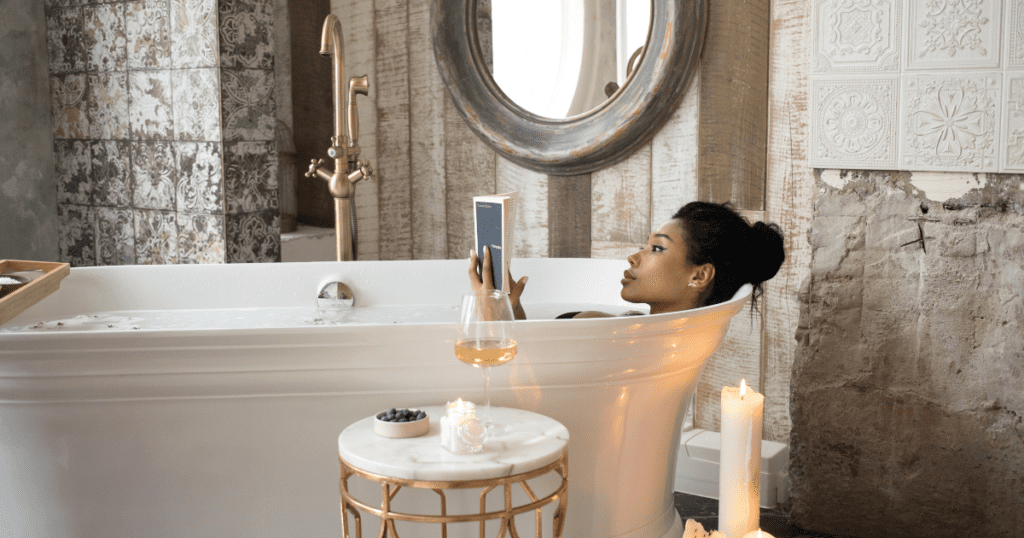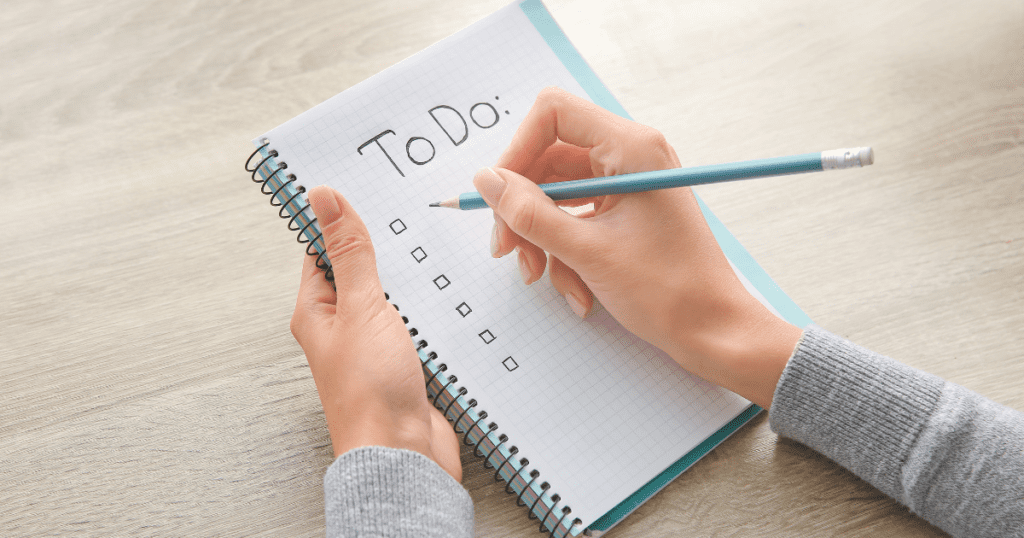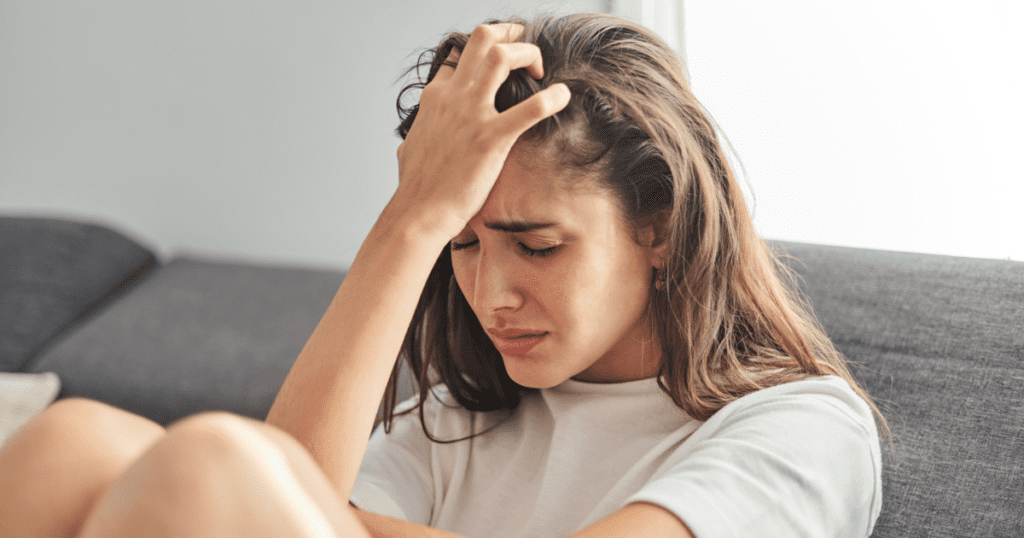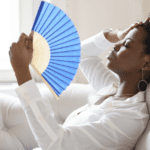Have you noticed you’re more anxious than usual lately? In menopause, anxiety is a common symptom that many women experience. Menopause anxiety can be difficult to cope with and can lead to a range of other physical and emotional issues.
In this blog post, we’ll discuss why women experience anxiety during menopause, the signs of menopause anxiety, and tips to help you feel better.
Why Do Women Experience Anxiety During Menopause?
Menopause is a natural part of aging, but it can be an emotionally difficult phase of life for many women. Our levels of estrogen and other hormones begin to decline, leading to physical and emotional changes. These changes can be a source of stress and anxiety for many women, who may feel overwhelmed and out of control.
Additionally, hormone fluctuations can trigger symptoms such as hot flashes, insomnia, and mood swings, which can further contribute to menopause anxiety.
Lastly, this phase of life can often coincide with other new life stressors. We may have children leaving the home to go away to college or to work and live independently. As we start to empty the nest, we may feel a loss of our sense of self. Who are we when we’re not full-time moms? What do we like to do when we’re not attending ballgames and choir concerts?
What are the Symptoms of Menopause Anxiety?
Menopause anxiety can manifest itself in a variety of ways. Common symptoms include:
- Feeling overwhelmed
- Difficulty concentrating
- Restlessness
- Rapid heartbeat
- Irritability
- Panic attacks
- Insomnia
- Social withdrawal
- Loss of appetite
- Muscle tension
- Sweating
- Nervousness
- Depression
If you’re experiencing any of these symptoms, it’s important to talk to your doctor about your menopause anxiety. You can take steps to help prevent or reduce the symptoms. Additionally, there are ways to deal with them when you are experiencing them.
Tips to Prevent or Reduce Menopause Anxiety
Get Plenty of Rest
Getting a good night of sleep is critical to keeping anxiety symptoms at bay, but it can be really hard to do during menopause. Insomnia is a common symptom during this phase and hot flashes may occur while you’re trying to sleep. Creating a good bedtime routine, cooling down your environment at night, and trying natural calming agents like lavender oil or chamomile tea may be helpful in getting an uninterrupted night of sleep. If you still struggle, try taking a quick nap over lunch or right after work.
Eat a Healthy Diet
Reducing your intake of processed foods, sugars, and alcohol can help prevent or reduce anxiety symptoms. Eating plenty of whole-food vegetables, fruits, grains, and lean protein will not only improve your physical health but your mental well-being as well.
Exercise Regularly
Exercise releases feel-good endorphins which are natural, cannabis-like brain chemicals that can enhance your sense of well-being. Getting at least 30 minutes 3 to 5 times a week can help you can confidence, take your mind off stressors, and help you cope with your anxiety in a healthy way. Try exercising in a group setting or with a friend – the social interaction aids even further in reducing depression and anxiety.

Try Relaxation Techniques
Developing a daily meditation habit can be very beneficial in staving off anxiety symptoms. If meditation isn’t your thing, try yoga. Its focus on the mind-body connection, coupled with controlled breathing and relaxation techniques, may help reduce stress, lower blood pressure, and lower heart rate.
Talk to Your Doctor
If your anxiety is severe or you’re having difficulty managing the symptoms, talk to your doctor. They can provide you with treatments and medications to help you manage your menopause anxiety.
Tips to Calm Yourself When You’re Feeling Anxious
Making lifestyle changes, like those mentioned above, can help prevent or reduce symptoms of anxiety. However, if you’re in the midst of feeling very anxious, you may find it helpful to have a set of immediate tools in your toolbelt to help calm yourself in the moment.
I’ve dealt with anxiety for as long as I can remember, even as a child. These are some of the things that I’ve found helpful, as well as a few other things I haven’t tried but others with anxiety have found helpful.
Try a Guided Meditation
My mind races too much to try to meditate on my own. However, I do find that I can calm it enough to follow a guided meditation. I like to use the Calm app. It has several 10–15-minute guided meditations that not only calm me down, but I often will fall asleep. I’ve started calling them my “napitations”.
The guide will instruct you to sit upright with your hands in your lap, and you can follow that approach if you’d like. I crawl into my bed and lie flat on my back under the covers to listen (thus, the napitation 😉).
Try a Mindfulness Technique
Sometimes when I’m struggling, I use a technique I read about years ago. You ground yourself in your current environment and start to name off what you see, what you hear, what you feel, what you smell, and what you taste. It helps your mind leave the thing you were feeling anxious about and bring it to your immediate surroundings.
Write in a Gratitude Journal
Writing down 5 things you’re grateful for does wonders for pulling you out of a bout of anxiousness. When my anxiety is really bad, I feel worthless and like I can’t do anything right. Finding things to be grateful for helps put things into perspective – that all is not bad in my world, I’m just focused on the bad things in that moment.
If I’m feeling too lazy to go get my journal and a pen, I simply close my eyes and name off the 5 things in my head.
Snuggle Your Pet
Did you know that research has shown that simply petting your dog lowers the stress hormone cortisol? When I cuddle my dog, I think about how she has not a single worry in the world. I believe dogs are made of pure, unconditional love, and it’s easy to feel that love when they’re cuddled up next to you. I’m sure the same applies to cats, but I’ve never had a cat so I can’t say firsthand.
So try calming down with your pet next time your anxiety hits.

Do Deep Breathing Exercises
Sometimes when I’m feeling anxious, my chest gets constricted, and I find it hard to breathe. If I decide to do a guided meditation on the Calm app, the guide will generally take me through a deep breathing exercise. If I don’t feel like going through a full guided meditation, or if I’m not in a place where I can, I do deep breathing exercises instead.
Here are a few that you can do when your anxiety is causing your breath to be restricted.
Do a Puzzle
Whether it’s a physical puzzle or one you do on your phone, this activity can help get your mind off of whatever was triggering your anxiety. I like to do puzzles on my phone, and there are so many to choose from. You can do word puzzles, crosswords, sudoku, and even solve riddles.
Watch a Stand-Up Comedy Show
This is one of my favorite activities in general, but it also helps with anxiety. Make your favorite hot tea (or other beverage), grab a warm blanket, and settle in for some belly laughs! You can find stand-up comedy shows on Netflix, HBO, Hulu, Comedy Central, YouTube TV – pretty much anywhere.
Take a Hot Bath
Use some lavender bath salts, light a candle, and relax. Afterward, put on your favorite PJs and watch a movie in bed.

Color in an Adult Coloring Book
I haven’t tried these, but I’ve heard really good things about them. They’re supposed to be very calming, and I think it would be satisfying to finish one and see how beautiful it turns out.
Find a Calming Hobby
If you’re in the throes of anxiety, doing a calming hobby can help. Try knitting, crocheting, or cross-stitching to keep your hands busy. If you’re more interested in art, try drawing, watercolors, or painting with acrylics. Is writing more up your alley? Try blogging or writing poetry. Don’t get too caught up on whether you’ll be good at it. Nobody even needs to see it. Do it for the enjoyment, not for the end result.
Go for a Walk Outside
It’s amazing what a little sunshine and fresh air can do for the soul. The physical activity of walking will also boost your mood. It can be very hard to get motivated to go if you’re feeling really anxious. Try just putting on your shoes and going outside without the expectation of a walk. If you’re feeling it once you’re outside, then you can get moving. If you’re not feeling it, just breathe in the fresh air for a bit.
De-Clutter
Some people can feel very overwhelmed when there’s clutter and chaos around them. If you’re in an environment and feeling overwhelmed, take a look around. Are you feeling that way because your area is very disorganized? Try taking a 10-minute de-cluttering break. You may feel a sense of calm afterward.
Make a List
I live by lists. If I try to keep too many “to do’s” straight in my head, I get anxious that I’ll forget one of them or feel overwhelmed because there are so many. That’s when I know it’s time to update my list. When I write everything down, it seems much more manageable. After I make my list, I go through and prioritize each item 1, 2, 3, etc. Then I highlight the items I must get done that day. It helps to know that, even when the list is long, it doesn’t all have to get done at once.
I would also encourage you to find items on your list that you can either delegate or perhaps don’t really need to get done anytime soon. Need to empty the dishwasher? Ask one of your kids to do it. Need to organize your sock drawer? That can really wait until your list is much shorter. Even if that’s 2 months from now.

Final Thoughts
Menopause anxiety can be difficult to cope with, but with the right tools and lifestyle changes, it is possible to manage your symptoms and feel better. If you’re experiencing menopause anxiety, try a few of these tips to help cope with it. Remember to talk to your doctor if you’re having difficulty managing your symptoms.




